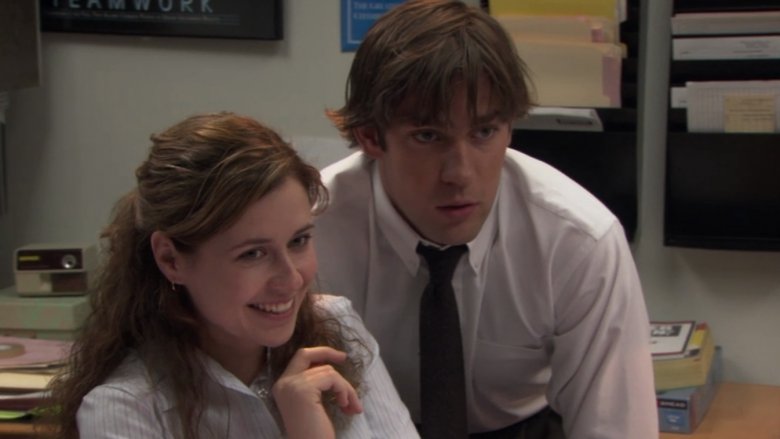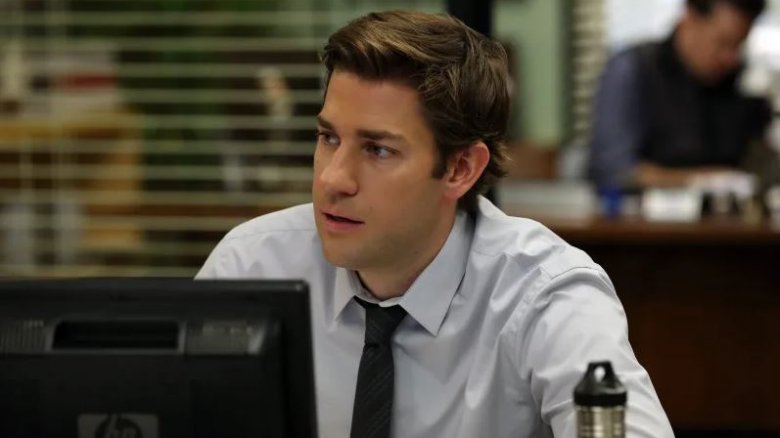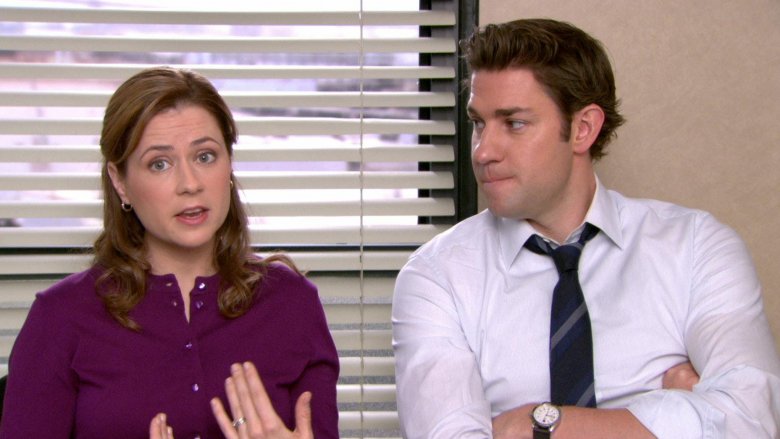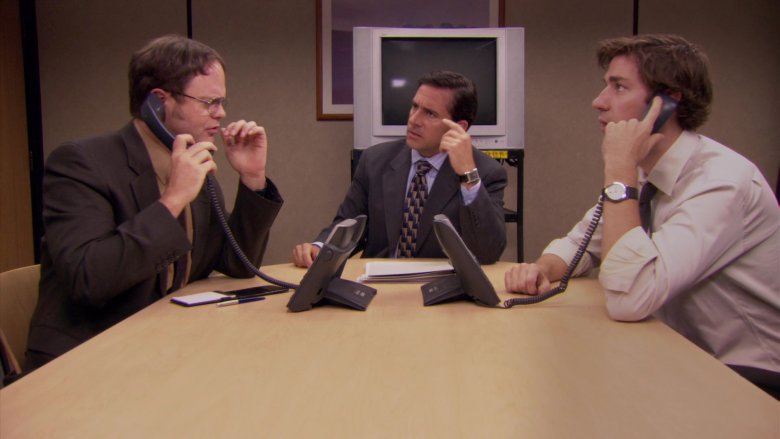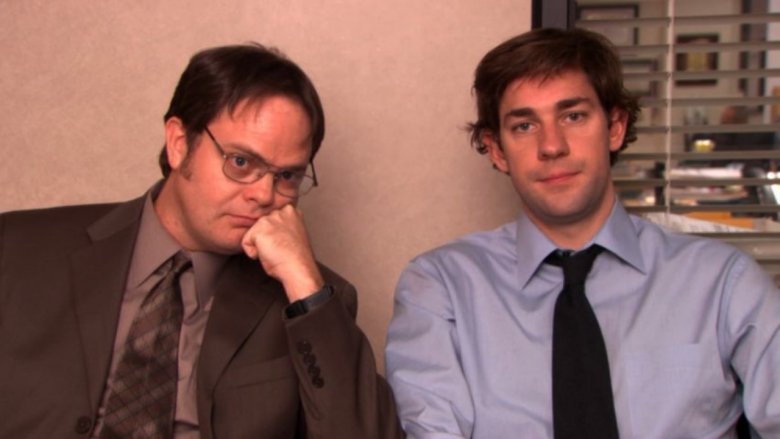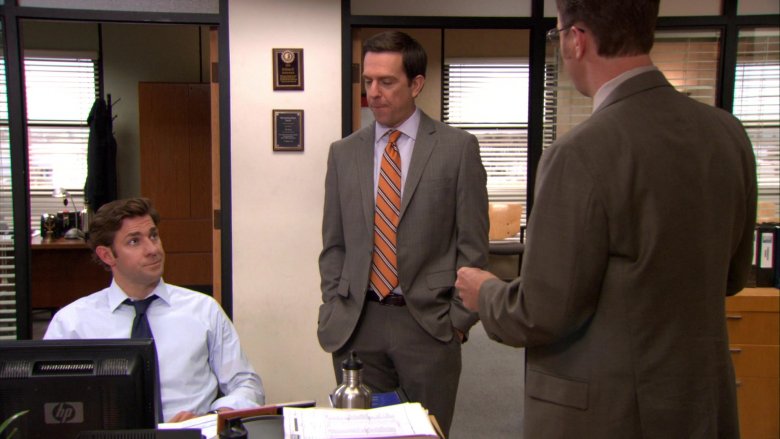Why Jim Halpert Should Have Been Fired From Dunder Mifflin
Everyone likes Jim Halpert. And what's not to love? The adorable hunk-and-a-half from Dunder Mifflin successfully played the role of "lovable heartthrob" for nine straight seasons on NBC's insanely popular sitcom The Office. Sure, he had some ups and downs during that time, but overwhelmingly, he was one of the show's most endearing characters. Heck, even the fictional audience in the show's finale spent time grilling Pam about how she shouldn't have doubted her husband ... even after he'd been pretty terrible to her for most of the last season.
And that's the thing about Jim. Underneath all of that soft, mushy, good guy exterior, Jim can be a pretty big jerk at times. Mr. Halpert's actions in the workplace, in particular, have often been rude, elitist, self-serving, and all-around objectionable.
The truth is, there are many different occasions during which Jim Halpert's definitely questionable behavior should've gotten him a warning, a slap on the wrist, or perhaps even a full disadulation. In fact — dare we say it? — there have been plenty of times that Jim Halpert should've been fired due to his workplace behavior. Don't believe us? Let's take a look at the evidence.
Jim Halpert is a slacker
Let's start with an obvious one. Jim Halpert is a slacker. Sure, he can hide behind his mysteriously incredible sales numbers all day long, but when you boil it down, the man just doesn't like to work unless he has to. He goes on record over and over again explaining how he's avoiding work at all costs. Take, for instance, the season three finale, The Job. When Karen asks if he wants to go to leave work in order to go to New York City early and hang out, Jim — who's operating as Michael's number two at the time — ditches his responsibilities without a second thought.
And then there's the moment in season seven when he hits his commission cap and literally stops working. While it's understandably difficult to motivate somebody under those conditions, it's hard to imagine any boss being okay with an employee wandering around the office, refusing to even look like they're trying to get any work done.
Whether he's expressing his frustration at having to show interest in his work, avoiding his responsibilities, or even something as simple as delaying purging his inbox, Jim has shown a repeated pattern of trying to avoid doing any more than the absolute minimum. It's hardly a recipe for success, let alone holding down a job for a decade-plus.
Jim spends more time flirting than working
Jim is extremely good at frittering away countless quantities of time in his romantic pursuits, especially while on the clock. One of the primary themes of the show for several years is Jim's flirting with Pam over the reception desk. In the words of Kevin Malone, the man has "spent hours up here at reception with [Pam]. Hours and hours. ... No, constantly — like, for years."
Ryan also brings it up in the season four episode Did I Stutter? when he mentions "hanging out at reception" as one of the reasons he's issuing a formal warning about Jim's work performance. While Ryan may have ulterior motives, it doesn't change the fact that for most of the first five seasons, whenever he gets a chance, Jim opts to flirt with Pam in one way or another, rather than get his work done.
The one notable exception is the chunk of time during the latter half of season three during which he's busy dating Karen, and even then he ends up spending gobs of work time talking, joking, and flirting with her instead (that example of ditching work for a trip with Karen to New York City works here yet again). The countless time spent in these romantic activities adds up fast, and that's hardly the kind of behavior that your typical not-Michael Scott kind of boss would put up with for long.
He's always distracting others
If Jim was mainly focused on quietly avoiding work and discreetly flirting all day, that would be bad enough. But it doesn't stop there. The "tall drink of sun tea," as Jo Bennett likes to call him, also loves to drag others into the rut of distracted behavior alongside him. For instance, in the season nine episode The Boat, he recruits several coworkers, including Nellie and Pam, in order to help create a fake radio show and then use it to trick Dwight with a fake interview. In the season three episode Safety Training, he gets a bunch of his coworkers to bet on everything from the number of jelly beans on Pam's desk to whether or not Creed will notice the difference between an apple and a potato.
Probably the most iconic series of distracting events, though, takes place in the season two episode Office Olympics. From gold medals in Flonkerton and betting on elevator arrivals to mouthfuls of candy and some fun closing ceremonies, Jim leads everyone in the office (except Angela) through an entire day of distracting non-work-related competitions. While it makes for quality television, there's little doubt that repeated interruptions of this magnitude would get an employee sacked in no time.
Jim Halpert has a really bad attitude
Along with things like distractions and general laziness, Jim's attitude occasionally sinks right down into the gutter of apathy. Particularly in the earlier seasons, the salesman is relentless in explaining how little he cares for his job. In the season four episode Local Ad, Jim expresses his approval of Dunder Mifflin getting a TV commercial because "when I tell people that I work at Dunder Mifflin, they think that we sell mufflers ... or muffins ... or mittens ... and frankly, all of those sound better than paper, so, I let it slide."
Honestly though, his embarrassment for the primary business of his own company is old news by that point. Right in the earliest episode of the show, Jim tries to explain his job as a salesman, ending the lackadaisical description with the statement, "I'm boring myself just talking about this." While it's a fairly safe bet that anyone who has to sell paper for a living would struggle with boredom, Jim's vocalization of this bad attitude towards his work on a regular basis would likely make him stand out like a sore thumb in a real workspace and make him a primary candidate for dismissal. After all, that kind of attitude can undermine morale like a cancer.
Jim would get fired for his low-quality work
Perhaps Jim Halpert's greatest litmus test comes in the middle of season five, when Michael Scott is temporarily fired and leaves to start his own paper company. While Michael eventually returns, during the interim, Jim is left under the much more realistic scrutiny of Charles Miner, who keeps a tight lid on Jim's shenanigans from day one.
During this uncomfortable time under real-life work pressure, Jim makes a comment that, while tongue-in-cheek, reveals a good deal of the motivation behind his typical work commitment. During the season five episode Dream Team, Jim declares that, "I mean, I've always subscribed to the idea that if you really want to impress your boss, you go in there and you do mediocre work, halfheartedly."
The joke is worth a laugh, but when you break it down, it really does exemplify Jim's work ethic throughout most of the show. Sure, there are moments where he focuses and tries harder, but usually, they're directly related to him gunning for a promotion or making money hand over fist. Apart from that, he seems to have very little motivation to do a good job while on the job. At the end of the day, Jim Halpert diligently working hard to provide quality results is a rare sight, indeed.
The man has poor priorities
A good employee (and by that, we mean an employee who isn't looking to get fired) is committed to their company's success. They care about putting in the time and making sure that they're coming across as "part of the team." Not so with Mr. Halpert. Along with slacking off and distracting others, Jim spends a solid portion of season nine siphoning off a full-time salary from Dunder Mifflin while he's splitting his days between his job and his new startup company, Athlead. It isn't until Dwight hires Clark as a junior sales associate that Jim officially goes down to part-time pay. And the money is just the tip of the iceberg.
Throughout the season, Jim remains completely invested in his own company, all while maintaining a sense of utter disregard for Dunder Mifflin — the company that's actively paying his salary. While it's easy to see why someone would get caught up in trying to turn their dream business into a reality, it doesn't change the fact that Jim's lack of interest and investment in his current job would normally have gotten him fired on the spot. Even within the show, there's a precedent for that fact. In the season four episode Money, Ryan informs Michael that since his other job is affecting his work performance, he has to quit it or he's fired. If the same principle held, Jim would've been discharged in no time.
Jim Halpert's pattern of disrespect
Michael Scott is a tough guy to work for. No one's arguing that fact. He's the poster boy of incompetent bosses. But just because you lack respect for your boss, that doesn't mean you can express it. Stanley shows his disdain for Michael in the season four episode Did I Stutter?, and an entire standoff ensues.
And yet, Jim manages to express a surprising level of disrespect for his boss on a regular basis. Sometimes the salesman mutters comments under his breath or to others behind Michael's back. But at other times, he straight-up talks down to Michael or treats him like a child, all the while knowing that Michael's irrational insecurities and desire to be liked by "the cool guy of the office" will pardon him and keep the manager coming back for more. While it's understandable behavior for anyone to exhibit after years of dealing with the likes of Michael Scott, it hardly changes the fact that, in a real workplace, treating your boss like an inferior is typically a quick path to an early termination.
Jim defrauded Dunder Mifflin
In the season eight episode Turf War, Robert California accidentally shuts down an entire branch of the company while in a drunken stupor, and Dunder Mifflin's top salesmen are immediately ready to jump at the opportunity. Dwight and Jim begin to scoop up a plethora of new clients, left in the wake of the shutdown, and when they reach their commission caps, they keep on selling by creating a fake employee named Lloyd Gross.
The fictional new entity allows them to rack up extra cash beyond the company-set commissions limit and then split the money between themselves. As Dwight puts it, the scheme allows them to "steal from the company. Embezzle. To commit fraud." But Jim's got a justification, saying, "Okay, it sounds sketchy, but it helps us get more money." It doesn't take much to figure out that deliberately skirting around company policy, especially in order to get those dollars, is a fireable offense. There isn't even a gray area here. Dwight and Jim themselves use the words "embezzle," "fraud," and "steal." Yup. This one can go in the "should've been fired" list, for sure.
Jim's abuse of power
For most of the show, Jim plays the part of a willing second-in-command and a simple salesman. However, for a brief spell during season six, he ascends the corporate ladder to the lofty position of co-regional manager. This puts him directly in the path of his ambitious coworker, Dwight, who does everything in his power to get Jim fired. But in the meantime, the stark reality of Mr. Schrute's life is that he temporarily answer to his archenemy.
The situation is entertaining to watch as it plays out, but in the intro to the season six episode The Promotion, things devolve into a rampant abuse of power on the part of the new boss. As Dwight attempts to file a complaint about Jim's behavior, he finds that he has to take the grievance directly to his superior, Jim Halpert. Jim declares that he takes complaints "very seriously" before running Dwight in circles through a battery of questions that leave the salesman in tears. While the short little opener is funny, if you step back and think about it, Jim stonewalls an employee (and one who's competing with him, no less) by refusing to take his complaint seriously. Abuse of power, much? We think so.
Drunk at Dunder Mifflin
There are a handful of things that are typical taboos at every office, and showing up for work drunk — let alone getting drunk at work — is certainly on that list. And yet, we see Jim get drunk not once but twice while at Dunder Mifflin over the course of The Office. The first time comes during the season three episode Diwali, when Jim, Karen, and Andy work late in order to do some order form consolidation. Andy comes to the event equipped with booze and ready to party, and Jim jumps right into the fun. Before long, the man is so plastered that he can't even stay awake on his desk, let alone bike home from work. Thankfully, Karen bails him out by giving him a ride, saving him the embarrassment of being found by his boss — Josh Porter, at the time — when he comes into work the next morning.
Clearly not having learned his lesson, in the season seven episode PDA, Jim takes Pam out to a lovely Valentine's Day lunch, during which they become hilariously drunk thanks to the bottomless champagne provided. Rather than call it a day and head home, though, they go right back to work, where they proceed to be ineffectual, distract others, and eventually "get busy" in a closet during the workday. The behavior is so over the top that it's absolutely worthy of a nice Valentine's Day-themed pink slip.
He's gone over the boss' head ... twice
As if working while drunk wasn't bad enough, it turns out that it isn't the only fireable offense that Dunder Mifflin's tallest salesman has committed twice. Jim has also gone over his boss' head in two separate scenarios. The first one comes in the season four episode Did I Stutter?, when Jim admits to Ryan that he gave suggestions to CEO David Wallace about Ryan's new website.
While Jim's insistence that he isn't purposefully trying to go over the head of his superiors is cute, it doesn't hold up very well considering the fact that, two short seasons later, he goes over his boss' head yet again in the episode The Meeting. This time, he meets directly with David Wallace again in order to suggest that he and Michael Scott both get promotions. While his intentions are never to directly undermine his boss, in both cases Jim shows a lack of respect for the chain of command, something that wouldn't put him in the good graces of any superior.
Jim would get fired for how he treats Dwight
Throughout the course of the show, Jim is generally respectful to his coworkers. However, there's one fellow that remains firmly fixed in his sites from day one: Dwight Schrute. The beet-wielding salesman establishes a hostile relationship with Jim before the show even starts, and it's on full display from the first episode.
While both characters participate in the tension-filled competition, it's Jim that typically outsmarts his opponent and comes out on top. Whether he's stealing Dwight's identity, misleading him with Morse code, or convincing him that he's the one smoking pot, Jim always manages to mess with Dwight's head in one way or another.
Not only that, but many of Jim's pranks lead to literal, physical harm or destruction of property. He convinces Dwight to fight himself, deludes him into throwing his cell phone off the top of a building, tricks him into knocking Stanley's coffee cup out of his hands, gets him to climb up a telephone pole — do we need to list more examples? The situation is hardly a friendly exchange of pranks. The man is clearly harassing his fellow employee, especially considering Dwight's frustrated response each time. Once again, it's the kind of over-the-top behavior that could quickly and easily result in termination without a second thought.
Jim would've been fired from Dunder Mifflin for lying about jury duty
Finally, we have Jim's time on jury duty, an event that gets an entire episode in season eight devoted to it. It centers on the fact that Jim has to take time off from work for jury duty, which takes all of half a day. However, the desperate dad ends up turning that into an entire week off in order to help Pam with the kids — still claiming all the while that he's on jury duty.
This one is tricky because, at first glance, all seems well as the episode wraps up, and Jim is forgiven by his coworkers who see he clearly had good intentions. However, the conclusion completely skips over the very real fact that Jim lied to his boss in order to get out of work. Repeatedly.
In the cutesy, artificial world of The Office, his close affiliation with his boss and coworkers may have bailed him out of a problem. However, in real life, if an employee took a week off work out of the blue — and lied about it to cover it up — there's little doubt that their days at that company would be numbered.


